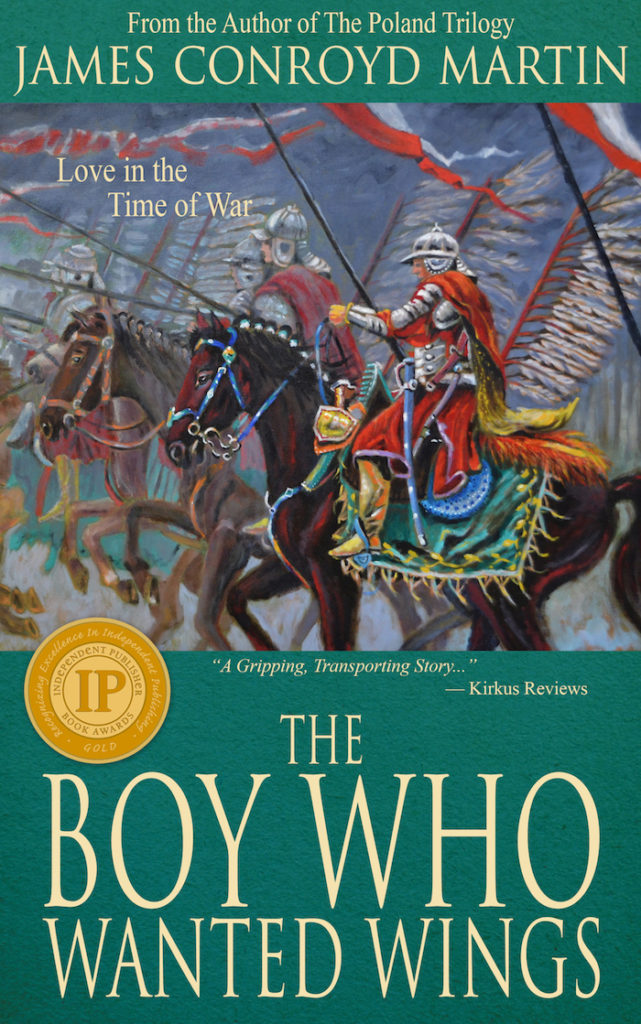The Boy Who Wanted Wings
 “A gripping, transporting story of self-determination set against fate.” ~Kirkus Reviews
“A gripping, transporting story of self-determination set against fate.” ~Kirkus Reviews
Aleksy, a dark-complexioned Tatar raised by a Polish peasant family, holds in his heart the wish is to become a Polish hussar, a lancer who carries into battle a device attached to his back that holds dozens of eagle feathers. As a Tatar and as a peasant, this is an unlikely quest. When he meets Krystyna, the daughter of the noble who owns the land that his parents work, he falls hopelessly in love. But even though she returns his love, race and class differences make this quest as impossible as that of becoming a hussar. Under the most harrowing and unlikely circumstances, one day Aleksy must choose between his dreams.
On the eve of September 11, 1683, a massive Muslim Ottoman horde was besieging the gates of the imperial city of Vienna and had been doing so since the previous July. Now, however, they were just hours from capturing this capital of the Holy Roman Empire. The Turks’ intent was to bring Islam to all of Europe, and this city was seen by East and West alike as the gateway. With the window of time closing for Vienna, the walls were about to be breached on September 12 when the vastly outnumbered Christian coalition, led by Polish King Jan III Sobieski and his famous winged hussars, descended Kahlenberg Mountain to engage the Turks in an attempt to lift the siege. As crucial and consequential as the 1066 Battle of Hastings, the ensuing battle changed the course of European history
(Was it the first 9/11? Some people believe that the date for the September 11th attack in 2001 was chosen to symbolically resume the effort that began in 1683.)
~Available in Paperback, Hardcover, and as an e-book~
Reviews for The Boy Who Wanted Wings
“A poor archer in medieval Poland takes aim at the love of his life in this epic novel from Martin. The anxious Aleksy Gazdecki, a young farmhand, embodies the ethnic and political tensions of Europe during the reign of the Ottoman Empire. Born to a Tatar family, he was taken in by Poles and raised a Christian. . . The believability of this novel, which is sprinkled with period-specific details, is never in question. Martin sets the stage so tidily that the plight of Aleksy and Krystyna, who desire to move beyond the social classes that keep them apart, transcends the historical moment. Underneath the story of the sweethearts’ labyrinthine struggle lingers the question of what it means to fight for one’s country but against one’s relatives—a situation in which Aleksy, as a Tatar, finds himself. Sprawling but never slow, the plot moves naturally from battle to intimacy and back again.”
~Kirkus Reviews
“Amidst class and religious warfare, this alternately romantic and brutal love story is also a reminder that the struggle between Christianity and Islam is a great deal older than 2001. Culminating in the re-creation of the Siege of Vienna in 1683, where monstrous killing was perpetrated in the name of God and power, this is a meticulously researched and convincingly written tale of love’s triumph that will surprise historical fiction readers with its little known historical backdrop. The main characters struggle with loyalties to family, race, and country as they come to understand that no fear or evil is unchangeable.”
~Leonard Kniffel, Past Editor in Chief of American Libraries
Director, Polish American Librarians Association
READING GROUP GUIDE
- Is ‘love at first sight,’ as in Romeo and Juliet, a possibility in real
life? Although Aleksy is stricken by the appearance of the girl in
yellow at first sight, their relationship develops over the course of
four meetings. What moments are particularly poignant and key in
that development? - After the initial physical attraction, might the deeper and enduring
relationship between Aleksy and Krystyna evolve because each
recognizes the rebel in the other? - Love encounters obstacles when it blooms between members of
different social classes, cultures, or religions. Consider the attitudes
and actions of Krystyna’s parents and those of Aleksy’s adoptive
parents regarding class and culture. - What does the story underscore about religion? History?
- Might someone today relate to the theme of the changeable versus
unchangeable in the same way as Aleksy does? - Szymon tells Aleksy that Kystyna seems to enjoy making a “fuss.”
What are some of the instances? What does the character trait reveal
about Krystyna? Do the instances prepare the reader for her jilting
of Fabian? - Szymon tells Aleksy: “I do pray when I breathe. And when I breathe,
I pray.” Much later, Aleksy thinks he understands. How would you
characterize Szymon’s philosophy of prayer? - What is it that would prompt someone like Aleksy to think he could
become a hussar? To think he could marry a nobleman’s daughter? - The theme of prejudice plays out through Aleksy and the world into
which he is adopted. How does he deal with prejudice? How does Idzi
supplement the theme? And Nadya? - Is Roman’s change-of-heart credible? Do you think he is sincere in his
acceptance of Aleksy?
